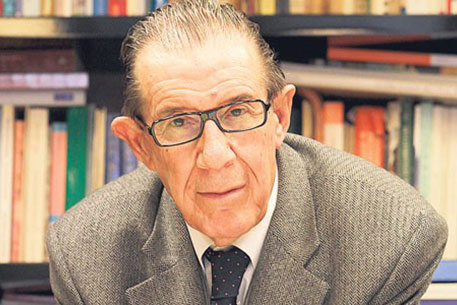
The month of August has served so that, within the courses of the Asturian School of Hispanic Studies, which were held at the Palacio de La Granda, in Asturias (Gozón Avilés), one of the topics considered as fundamental of our economy was analyzed very thoroughly: energy. For this, the matter was studied thoroughly and critically. In addition, debates among experts were held at the end of each intervention. This highlighted the current Spanish energy reality and the main perspectives that open up to it.
These meetings were held the 1st, 2nd, and 3rd of August in 2011. Opening the sessions was José Molero, professor of Applied Economics at the Universidad Complutense of Madrid, who created the basic design for the links between the whole of the Spanish economy, and the development of the energy sector. Then, Professor Victoriano Martín, professor of Applied Economics at the Universidad Rey Juan Carlos, developed a brilliant intervention: to expose current risks, especially from the famous Jevons essay, recently updated both by the "Hubbert peak" and the 1999 document directed by Leontief within the movement generated by the Club of Rome, with its antecedent in Malthus and its latest consequences in relation to the "greenhouse effect". Closing the day on August 1st was professor of Nuclear Physics at the Universidad Politécnica de Madrid, Guillermo Velarde Pinacho, who clarified in a perfect way the economic advantages of this type of alternative energy, but also the exaggerations which have expanded, especially since Chernobyl and Fukushima.
On August 2, the meetings opened with a magnificent, it should also be said, exhaustive, conference on the role that renewable sources of electricity represent in Spain by María Sicilia Salvadores, responsible for Foresight of Iberdrola Renovables. It was followed, with an exhibition in which she showed off a very successful statistical complement, very opportune in addition, to scientifically reduce, excessive degrees of certainty that expand on the greenhouse effect. The conference ended with Juan José Sanz Donaire, professor of Geography at the Complutense University of Madrid. At the end, the question of the title given at the beginning of his speech persisted: Is there climate change? The question is not elucidated scientifically.
The authority of José Luis Díaz Fernández provided a very complete vision of the current reality of oil and the threat of a third crisis, patent, with all the oscillations that are wanted, in the march of crude oil prices.
Closing the meetings, in a brilliant way, was Vicente Luque Cabal, who up until now was a member of the General Direction of Energy and Transport of the European Commission. Thanks to him, it became clearer the still possible role of coal within the whole of European policy, that prepares what could be absurd questions of energy independence with possible derivations towards climate consequences.
The third and final day of the course, Julio Artigas Cano de Santayana, who is the boss of the IDEA Biomass and Waste Department, presented two issues with very complete documentation; both energy related to biomass, and energy derived from the use of urban waste.
Juan Avilés Trigueros, an industrial engineer, gave a very lively presentation, on the Spanish energy problem and its important tensions, and specifically, of the possibilities that are still open to hydroelectricity.
Finally, these sectoral exhibitions culminated with the contribution of Conrado Navarro Navarro, Deputy Director of Development of Iberdrola, who dealt with gas in the generation of electricity, as well as its present and future.
If each and every one of these exhibitions were brilliant, it was still situated, no longer in parallel, but in perfect synthesis in the scientific and didactic field, the closing conference, by Fernando Bécker Zuazua, professor of Applied Economics at the Universidad Rey Juan Carlos, who presented a splendidly well-locked synthesis of all our energy problems.
The eleven speakers brought such well structured and widely presented papers, that I suggested to Professor Becker the interest that a quick publication of the eleven papers would have for Iberdrola, the Asturian School of Hispanic Studies of La Granda, and the general public. I offered to write an introduction for that book. I repeat this request here, because there is such a set of ignorance and such a mass of hoaxes around the energy problem, that this book could be very important. In my opinion, it would be necessary to add two essays to the above. One would refer to the past of Spanish energy connections, because it is not only Spain, in this sense, practically an island, but, in its interior, an archipelago. And another, which would refer to prices and the market, with special consideration of the question of tariffs; taxes, fuel prices, subsidies for coal and renewable energies, depreciation and obligations in the form of pecuniary reparations derived from the nuclear stoppage, and finally, the projection beyond the Spanish borders of our energy companies, as is, without going any further, the case of Repsol or Iberdrola.
Having made this detailed examination is fundamental for this moment of Spain. I dare add that, without addressing and resolving it, our competitiveness will collapse. If this were to happen, the possibilities of being able to repay outstanding public and private loans would disappear. As a result, we would be condemned to a sad and prolonged decline."

